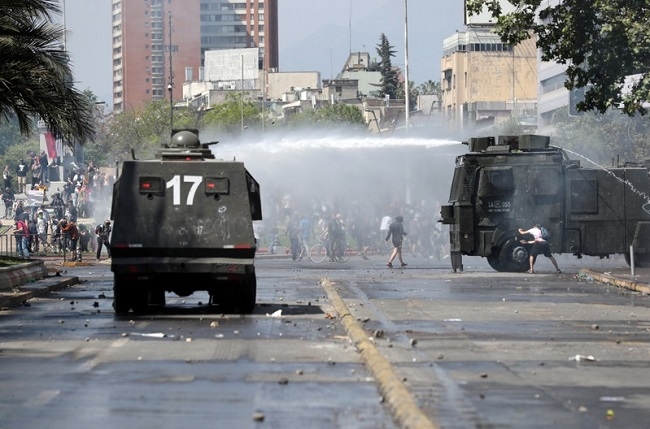


 Riot
police vans shoot water cannons during a protest against Chile's state economic
model in Santiago October 20, 2019.
Riot
police vans shoot water cannons during a protest against Chile's state economic
model in Santiago October 20, 2019.
"We are at war against a powerful enemy, who is willing to use violence without any limits," Pinera said in a late-night televised statement at army headquarters in Santiago.
He confirmed the state of emergency he declared for Santiago on October 19 night, which brought the military onto the streets, would be extended to the north and south of the capital.
Protests led by students began two weeks ago over fare hikes on public transport.
Pinera said Santiago´s metro and bus system would operate a partial service on October 21, along with hospitals and some schools and crèches, and appealed for Chileans to band together and help their neighbors to get on with their lives and remain safe.
"Tomorrow we will have a difficult day," he said. "We are very aware that (the perpetrators of riots) have a degree of organization, logistics, typical of a criminal organization," he said.
He cited 70 "serious incidents of violence" on October 20, including the looting of 40 supermarkets and other businesses. Chadwick said military and police numbers were at 10,500 in Santiago and would be reinforced where necessary.
Santiago and other Chilean cities have been engulfed by several days of riots, along with peaceful protests, after the increase in public transport costs. The violence prompted Pinera to reverse the move and declare a state of emergency.
Chadwick said seven people had been killed in incidents related to the protests, without giving further details.
He said the state of emergency applied in Santiago early on October 19 would be rolled out to Antofagasta, Valparaiso, Valdivia, Chillan, Talca, Temuco and Punta Arenas.
There was transport deadlock in Santiago and chaos at the international airport on Ocotber 20, where flights into and out of the capital were suspended or canceled because crew members and airport staff were unable to get to work, the city's governor said.
Prosecutors said 1,462 people had been charged by mid-afternoon on October 20 in connection with that day's protests, 614 of them in Santiago, That followed 179 arrests in Santiago on October 19.
The military authorities mandated by Pinera with reestablishing order in Santiago declared on October 20 another night-time curfew in the capital as the government struggled to contain violent protests, looting and arson.
The general in charge of security in Santiago announced the curfew would begin at 7 p.m. (2200 GMT) on October 20 and end at 6 a.m. on October 21 (0900 GMT).
However, several large demonstrations continued past the mandated curfew hour, witnesses and Chilean media reported.
Source: NDO